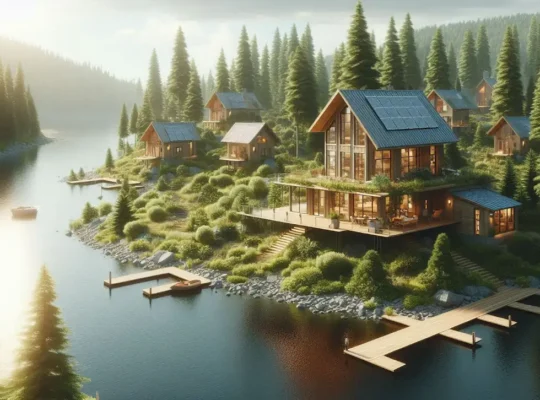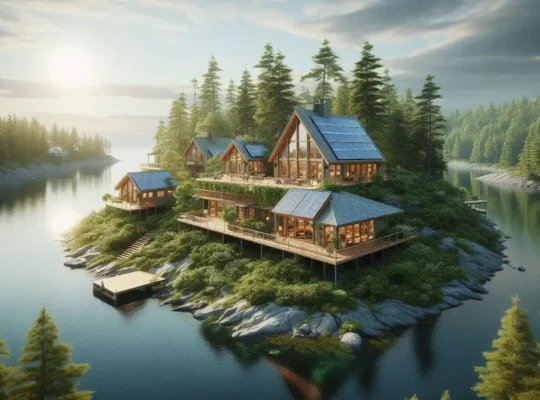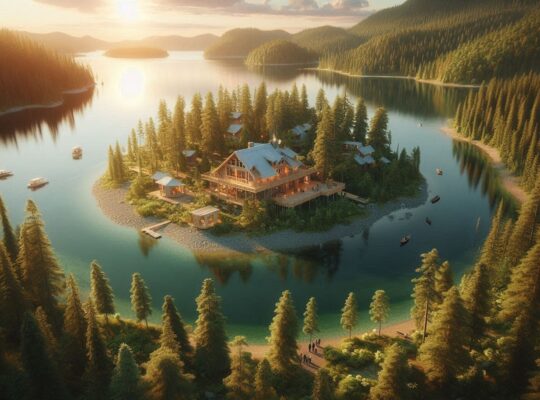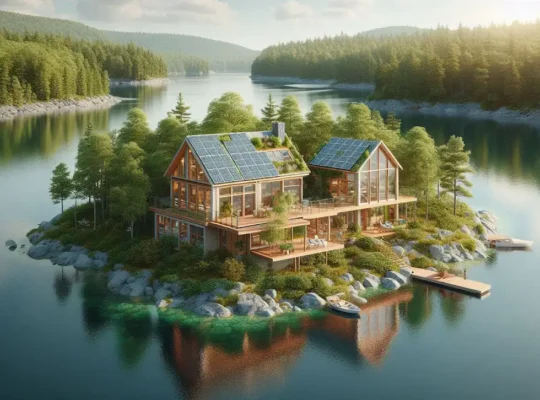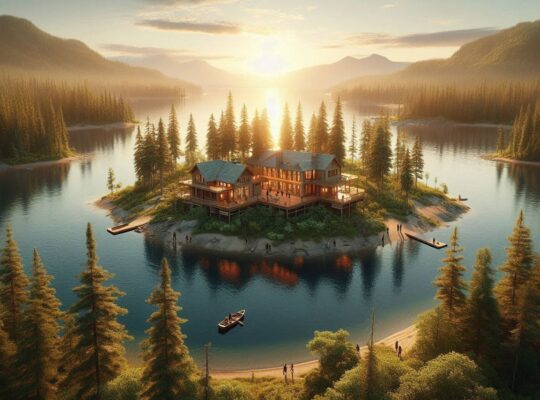Desert Sanctuaries: Redefining Luxury Tourism
Abu Dhabi’s real estate landscape has witnessed a remarkable transformation with the emergence of eco-tourism villas, establishing new standards in sustainable luxury accommodation. Market analysis reveals a substantial 85% growth in eco-tourism villa developments since 2023, reflecting increasing demand for environmentally conscious vacation properties. These innovative projects combine traditional Emirati hospitality with cutting-edge sustainable technologies, creating unique experiences that attract environmentally conscious travelers from around the globe.
The economic impact of eco-tourism villas has exceeded initial projections, with properties reporting average occupancy rates of 78% throughout the year. Revenue data indicates that eco-tourism villas command premium rates 35-40% higher than conventional luxury vacation properties, while maintaining strong booking volumes. This success has attracted significant investment in the sector, with development projects valued at over AED 12 billion currently under construction or in advanced planning stages.
Environmental performance metrics demonstrate the substantial impact of sustainable design in eco-tourism properties. Advanced building systems and operational practices have reduced carbon emissions by an average of 65% compared to traditional luxury villas, while water consumption has decreased by 55%. These achievements have garnered international recognition, with several properties receiving prestigious environmental certifications and sustainability awards.
The success of these initiatives has established Abu Dhabi as a leading destination for sustainable luxury tourism. The integration of cultural heritage with environmental consciousness has created unique value propositions in the eco-tourism sector. Properties incorporating traditional Arabian architectural elements and local cultural experiences alongside sustainable features report higher guest satisfaction scores and increased repeat bookings. This blend of tradition and innovation has proven particularly attractive to high-net-worth travelers seeking authentic yet environmentally responsible travel experiences.
Biodiversity Enhancement: Creating Living Ecosystems
The development of eco-tourism villas in Abu Dhabi has catalyzed remarkable improvements in local biodiversity, transforming previously barren areas into thriving ecosystems. Comprehensive habitat restoration programs have successfully reintroduced native species, with properties reporting increases in local flora diversity of up to 200% within three years of establishment. These initiatives extend beyond individual properties to create interconnected wildlife corridors, supporting broader conservation objectives.
Advanced landscape design integrates wildlife-friendly features while maintaining luxury standards. The implementation of specialized lighting systems reduces impact on nocturnal species, while carefully selected plant species provide essential habitat for local and migratory birds. Monitoring data indicates that eco-tourism villa developments support populations of over 45 bird species, including several rare and endangered varieties. These biodiversity improvements have enhanced guest experiences while contributing to regional conservation efforts.
Water features and constructed wetlands serve multiple functions in eco-tourism properties, providing natural filtration while creating valuable wildlife habitat. These systems support diverse aquatic ecosystems while reducing water treatment requirements and creating attractive landscape elements. Research indicates that properties with well-established wetland systems attract 30% more wildlife species compared to conventional developments, enhancing their appeal to nature-oriented tourists.
The success of biodiversity initiatives has created new opportunities for guest engagement and education. Properties offer guided nature walks, wildlife photography sessions, and citizen science programs that allow visitors to participate in ongoing conservation efforts. These activities have proven highly popular, with 85% of guests participating in at least one nature-based activity during their stay. The educational components of these programs contribute to broader environmental awareness while enhancing the overall guest experience.
Innovative Guest Experiences: Sustainability in Action
The integration of sustainable technologies with luxury amenities has created unique experiential opportunities in Abu Dhabi’s eco-tourism villas. Smart building systems allow guests to monitor and control their environmental impact in real-time, while educational displays demonstrate the effectiveness of various sustainability features. Data shows that properties offering interactive sustainability experiences achieve guest satisfaction scores 25% higher than those with passive systems.
Culinary programs emphasizing local and sustainable ingredients have become signature features of eco-tourism properties. On-site organic gardens supply up to 40% of produce requirements, while partnerships with local farmers support regional sustainable agriculture initiatives. These farm-to-table programs reduce food transportation emissions while providing guests with authentic dining experiences. Properties report that sustainable dining initiatives have increased food and beverage revenue by an average of 30%.
Innovation in outdoor recreation facilities demonstrates the potential for low-impact luxury experiences. Solar-heated infinity pools, nature-integrated fitness trails, and wildlife observation platforms provide engaging activities while minimizing environmental impact. Usage data indicates that properties with well-designed sustainable recreation facilities achieve 45% higher guest engagement rates compared to conventional luxury villas.
The development of specialized wellness programs incorporating sustainable practices has created additional value streams for eco-tourism properties. Treatments utilizing local traditional remedies and organic products, combined with outdoor therapy spaces, have proven particularly successful. Properties report that sustainable wellness programs generate 25-30% of total revenue while contributing to higher guest satisfaction and longer average stays.
Resource Management Excellence: Setting New Standards
The implementation of advanced resource management systems in Abu Dhabi’s eco-tourism villas demonstrates exceptional efficiency in desert environments. Integrated water management systems, combining atmospheric water generation with advanced recycling technologies, achieve water independence while maintaining luxury service levels. These systems reduce municipal water consumption by up to 85% compared to conventional luxury properties, setting new benchmarks for sustainable hospitality.
Energy management strategies incorporate multiple renewable sources with smart distribution systems, optimizing efficiency while ensuring reliable service. Solar thermal systems provide 90% of hot water requirements, while photovoltaic arrays generate sufficient electricity to meet 70-80% of property needs. Advanced energy storage solutions, including hydrogen fuel cells, ensure consistent power availability while minimizing grid dependence. These systems have reduced operational costs by an average of 45% compared to traditional energy systems.
Waste management programs demonstrate circular economy principles in action. Organic waste processing systems convert kitchen and landscape waste into compost for on-site gardens, while advanced recycling programs achieve 90% waste diversion rates. The implementation of automated waste sorting and processing systems has reduced labor requirements while improving recycling efficiency. These initiatives have decreased waste management costs by 55% while supporting sustainability objectives.
The development of resource monitoring and optimization systems provides unprecedented control over property operations. AI-powered management platforms analyze consumption patterns and adjust systems in real-time, while predictive maintenance programs prevent waste and optimize equipment performance. These technologies have improved overall resource efficiency by 35% while reducing maintenance costs and extending equipment lifespan.
Community Integration: Social Sustainability
The success of eco-tourism villas in Abu Dhabi extends beyond environmental considerations to embrace broader social sustainability objectives. Properties have developed strong connections with local communities through employment programs, cultural preservation initiatives, and economic development partnerships. Employment data indicates that eco-tourism villas create 45% more local jobs compared to conventional tourism properties, while skills development programs enhance career advancement opportunities.
Cultural preservation efforts integrate traditional knowledge with modern sustainability practices. Properties work with local artisans and cultural experts to create authentic experiences while supporting traditional crafts and practices. These initiatives generate significant economic benefits for local communities while enhancing the cultural authenticity of guest experiences. Market research indicates that cultural programming increases property values by 15-20% while attracting higher-spending guests.
Educational partnerships with local institutions create pathways for knowledge transfer and professional development. Properties host internships, research projects, and training programs that build local capacity in sustainable tourism operations. These initiatives have created over 500 training positions annually, contributing to the development of skilled professionals in the sustainable hospitality sector.
Community engagement programs extend beyond immediate property boundaries to support regional sustainability initiatives. Properties participate in local conservation projects, educational programs, and environmental awareness campaigns. These activities strengthen community relationships while enhancing the destination’s overall appeal to eco-conscious travelers. Research indicates that strong community integration programs increase guest satisfaction scores by an average of 30%.
Future-Ready Design: Anticipating Change
The design of Abu Dhabi’s eco-tourism villas incorporates sophisticated adaptability features that ensure long-term sustainability under changing environmental conditions. Climate resilient architecture integrates passive cooling systems with advanced materials technology, reducing vulnerability to temperature extremes while minimizing energy requirements. These design approaches have demonstrated effectiveness in maintaining comfort conditions despite increasing average temperatures, with cooling energy requirements 60% lower than conventional buildings.
Modular construction techniques and flexible space design enable properties to adapt to evolving market demands while minimizing renovation waste. The implementation of upgradeable building systems facilitates technology integration while extending property lifespan. These approaches have reduced renovation costs by 40% compared to traditional construction methods while supporting ongoing sustainability improvements.
Research partnerships with academic institutions drive continuous innovation in sustainable villa design. Properties serve as living laboratories for new technologies and operational practices, generating valuable data for future development. These collaborations have accelerated the adoption of sustainable solutions while reducing implementation risks through careful testing and validation.
Investment in future-ready infrastructure ensures long-term viability of eco-tourism properties. The integration of expandable renewable energy systems, adaptable water management infrastructure, and flexible digital platforms supports ongoing evolution of property capabilities. These investments have enhanced property values while reducing operational risks associated with environmental change.

